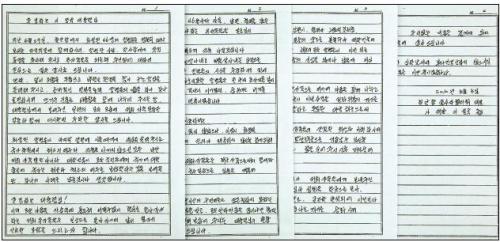Slashing inter-Korean trade and reviving anti-North Korean propaganda campaigns in the Demilitarized Zone appeared to be part of South Korea’s measures for retaliating for the sinking of its warship in March.
In addition, the government also is reportedly considering banning North Korean ships from passing through the Jeju Strait running between Jeju Island and the Korean Peninsula.
These measures, however, fall short of military action and are being considered because they would impact North Korea without causing too much trouble for Seoul.
In addition, the government also is reportedly considering banning North Korean ships from passing through the Jeju Strait running between Jeju Island and the Korean Peninsula.
These measures, however, fall short of military action and are being considered because they would impact North Korea without causing too much trouble for Seoul.

The North largely depends on fishing and inter-Korean trade to finance its sluggish economy.
One concern South Korea has regarding retaliation against the North is that they may clash with existing inter-Korean agreements, such as the pact signed in 2004 under which the two Koreas agreed to refrain from all propaganda activities near the military demarcation line.
A separate agreement also signed in 2004 permits North Korean ships to travel naval paths between the two Koreas, including the Jeju Strait.
The South’s argument would be that Pyongyang first violated the inter-Korean agreements if found to have masterminded the sinking of the Cheonan on March 26.
Seoul, however, would be tighter bound to international regulations and responsibility to maintain regional peace and security.
South Korea therefore must find ways to issue penalizing measures, but refrain from provocative or military action, experts said.
Seoul appeared to be considering its options for dealing with the North amid an ongoing probe into what caused the Cheonan to sink.
The government-led investigation team last week said a torpedo may have been responsible for Cheonan’s misfortune.
But the Defense Ministry later stressed that a conclusion is still forthcoming as the investigation has yet to end.
As diplomatic measures, the government is considering presenting the issue at the United Nations if Pyongyang is seen as the culprit.
Seoul also has enlisted support from its allies and others in international society.
It was earlier irked when North Korean leader Kim Jong-il met with Chinese president Hu Jintao as the South expected Beijing to cooperate on the Cheonan issue.
Seoul on Friday said Beijing briefed it on Kim’s visit.
South Korea has indicated that even the six-way talks aimed at ending Pyongyang’s nuclear ambitions should be put on hold until the investigations yield concrete results.
Pyongyang, on the other hand, is frustrated with the South for refusing to resume its tours to Mount Geumgang, a resort in the North.
North Korea has since last April been boycotting the denuclearization talks, citing a U.N. denouncement of its rocket launch. In May, the reclusive state conducted its second nuclear test.
By Kim Ji-hyun (jemmie@heraldcorp.com)
One concern South Korea has regarding retaliation against the North is that they may clash with existing inter-Korean agreements, such as the pact signed in 2004 under which the two Koreas agreed to refrain from all propaganda activities near the military demarcation line.
A separate agreement also signed in 2004 permits North Korean ships to travel naval paths between the two Koreas, including the Jeju Strait.
The South’s argument would be that Pyongyang first violated the inter-Korean agreements if found to have masterminded the sinking of the Cheonan on March 26.
Seoul, however, would be tighter bound to international regulations and responsibility to maintain regional peace and security.
South Korea therefore must find ways to issue penalizing measures, but refrain from provocative or military action, experts said.
Seoul appeared to be considering its options for dealing with the North amid an ongoing probe into what caused the Cheonan to sink.
The government-led investigation team last week said a torpedo may have been responsible for Cheonan’s misfortune.
But the Defense Ministry later stressed that a conclusion is still forthcoming as the investigation has yet to end.
As diplomatic measures, the government is considering presenting the issue at the United Nations if Pyongyang is seen as the culprit.
Seoul also has enlisted support from its allies and others in international society.
It was earlier irked when North Korean leader Kim Jong-il met with Chinese president Hu Jintao as the South expected Beijing to cooperate on the Cheonan issue.
Seoul on Friday said Beijing briefed it on Kim’s visit.
South Korea has indicated that even the six-way talks aimed at ending Pyongyang’s nuclear ambitions should be put on hold until the investigations yield concrete results.
Pyongyang, on the other hand, is frustrated with the South for refusing to resume its tours to Mount Geumgang, a resort in the North.
North Korea has since last April been boycotting the denuclearization talks, citing a U.N. denouncement of its rocket launch. In May, the reclusive state conducted its second nuclear test.
By Kim Ji-hyun (jemmie@heraldcorp.com)









![[Hello India] Hyundai Motor vows to boost 'clean mobility' in India](http://res.heraldm.com/phpwas/restmb_idxmake.php?idx=644&simg=/content/image/2024/04/25/20240425050672_0.jpg&u=)








